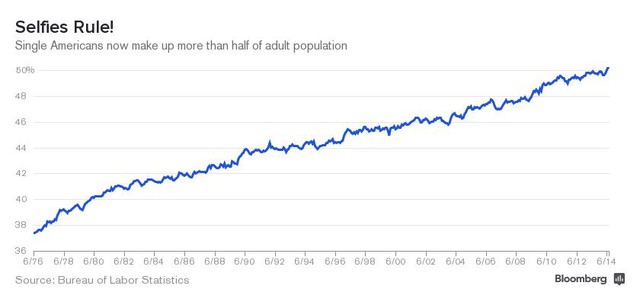
Single Americans are now on the cusp of being declared a majority of the U.S. adult demographic. The shift away from marriage happened in just a few decades, practically overnight. It plays right into the hands of central planners who have always been keen on getting rid of marriage altogether.
The U.S. Census Bureau recently reported that 2013 showed the lowest marriage rate ever (or since it started keeping those records in 1920.) Those figures add up to 50.3 percent of adults (18 and older) married. That compares to a high of 72.2 percent in 1960. And the Bureau of Labor Statistics just released figures that show marrieds in the minority, with singles topping the chart at 50.4 percent. The Labor Department “cheats” a bit, since it defines adults from the school age of 16 and up. Here’s a graph of those figures from Bloomberg News:

Any way you look at it, the United States has undergone a seismic shift in marriage culture over the past few decades. Marrieds should be concerned about the trend, but not because singles have it in for married folks. Not at all, and in fact, the majority of them say they want to get married. However, a small, vocal, and organizing core of “singles activists” are starting to prod and poke everyone to tell marrieds: “check your privilege!” They basically claim that all economic or social benefits for marriage discriminate against singles.
Singles’ rights activists want you to know that September 21-27, 2014 is “Unmarried and Single Americans Week.” But they may not want you to know—perhaps not just yet—that they basically want all state-recognized marriage abolished.
That goal may seem harmless to some. But when you realize that it would invite the abolition of all state recognized familial relationships, it should give you pause. In the end, it would legally separate and divide us all up, putting us ever more at the mercy of a bureaucracy which may or may not recognize any family ties.
Singles’ activists have been waiting in the wings, eager to latch onto arguments passed to them by their LGBT allies after same-sex marriage officially becomes a done deal. Those arguments lead directly to the next phase of the “marriage relay race,” in which the finish line is the abolition of all state-recognized marriage.
It’s much closer than you think. And the implications are huge. We need to understand them.
Growing Hostility towards Marriage
While most Americans have been going about their lives with a false sense of security that the rule of law will always prevail, there’s been a heck of a lot of social engineering going on. We feel it in the erosion of parental rights, the overreach of the public schools and Common Core curriculum, the dictates of political correctness and speech codes on college campuses, the excesses of the sexual revolution, the poverty rate for children of single mothers, and many other social ills that have paced the decline of marriage.
Americans do squawk about these things from time to time, but we tend also to adjust and then delve back into the business of living and work. So sweet is our trust that none dare interfere with our solace in the sanctuary of our families and our homes. But we’re waking up to a campaign of hostility to marriage that is growing in volume and intensity. Major cultural forces—the media, academia, Hollywood—just keep trending that way. “Greedy” has become a new way they describe married people. This is supposedly because married folks generally pool their resources, have kids, and get some financial benefits that singles don’t get.
Consider this statement from a New York Times feature by Natalie Angier, “The Changing American Family:” “Single people live alone and proudly consider themselves families of one – more generous and civic-minded than so-called ‘greedy marrieds.’” Stephanie Coontz, author of Intimate Revolutions, is quoted in the article as saying: “We’re seeing a class divide not only between the have and the have-nots, but between the I do’s and the I do nots.” Nancy Pelosi chimed in last Valentine’s Day with the snarky question, “Why would anybody get married?”
The Atlantic Monthly ran a feature last year entitled “The High Price of Being Single in America,” which claimed that half the population suffers from “institutionalized singlism, the discrimination of individuals based on marital status.” The co-authors of the article calculated financial costs of singlehood as though they were damages inflicted on the unmarried by “marital privileging,” on the part of the state.
Can you feel a bit of envy and a class war being stirred up here? The singles’ movement is definitely stoking a new divisiveness in America. As if we need more!
The Not-So-New ‘Victims’
Singles activists have been saying for at least two decades that singles are treated like second-class citizens compared to marrieds. And the idea of “marriage equality” makes singles feel even more empty-handed than before. The system is stacked against them, they say, as long as married people—gay, straight, or otherwise—get legal recognition, tax breaks, and social perks singles don’t. In fact, the groundwork for abolishing marriage has largely been laid by their many supporters in the gay lobby, folks like Thomas Coleman, who founded the American Association for Single People back in the ’90’s, and author of “The Domino Effect” about how to do super-fast social transformation.
Consider the following progression. State acceptance of gay marriage undermines the original and only valid state interest in marriage, which is to encourage those who sire and bear children together to be responsible for rearing them. If “marriage” becomes the legal union of any two or more people for any other reason at all, it ceases to be a unique institution upon which benefits are reasonably conferred. Benefits in such a circumstance start to look more like irrational, harmful discrimination against those not in married relationships. Then government ceases to acknowledge a “dead” institution.
The words of Judge Vaughn Walker in California in overturning Proposition 8 serve as a perfect example of the coming precedent. He claimed, “Proposition 8 does nothing more than enshrine in the California Constitution the notion that opposite sex couples are superior to same sex couples.” He also noted that the ban on same-sex marriage “increases costs and decreases wealth for same sex couples because of increased tax burdens, decreased availability of health insurance and higher transactions costs to secure rights and obligations typically associated with marriage”
Just replace Walker’s terms with “singles” versus “marrieds” and you have a ready-made argument to abolish all state-sanctioned marriage. The fact that children—the only valid state interest in marriage—have been so marginalized in this debate only sharpens the “singlism” case. Children make but a fleeting appearance in the context of “marriage equality.” They were accumulated into same-sex households for a period of decades, and then “grandfathered in” as handy props for passing “marriage equality” laws through the courts.
‘Unmarried Equality’ is ‘Marriage Equality 2.0’
Gay activist and journalist Masha Gessen clarified it all when she announced, “Gay marriage is a lie.” At a 2012 panel discussion in Sydney, she explained: “Fighting for gay marriage generally involves lying about what we’re going to do with marriage when we get there.” [Applause.] “It’s a no-brainer that the institution of marriage should not exist.”
In the meantime, Bella DePaulo is spearheading the singles’ movement as a blogger for Psychology Today and author of “Singled Out: How Singles are Stereotyped, Stigmatized, and Ignored and Still Live Happily Ever After” and “Singlism: What it is, Why it Matters, and How to Stop It.” According to DePaulo, the discrimination she calls “singlism” may seem more subtle than racism or sexism, but is just as damaging. She doesn’t seem to say outright that civil marriage should be abolished. But timing is everything, and for the moment “unmarried equality” depends upon consolidating the LGBT “marriage equality” movement for its own success. So DePaulo has latched onto the idea of “minimizing” marriage: giving singles the same benefits as married individuals. In other words, the idea is to abolish marriage without saying so.
DePaulo has catalogued 37 arguments and organizations that have been promoting singles activism for many years. Those include the 2006 manifesto, “Beyond Same Sex Marriage,” feminist legal theorist Martha Fineman’s case for abolishing marriage, and former White House regulatory czar Cass Sunstein’s specious claim that abolishing marriage would simply “privatize” it. “Singlism” may soon be considered a form of illegal discrimination if legislators and judges accept the gist of DePaulo’s argument here:
Because singlism is built right into American laws, it is not possible to be single and not be a target of discrimination. If you have followed the marriage equality debate, then you probably know that there are more than 1,000 federal laws that benefit or protect only those people who are legally married. Even if same-sex marriage becomes legal throughout the land, all those people who are single—whether gay or straight or any other status—will still remain second class citizens.
And there you have it. DePaulo borrows the ready-made argument from same sex marriage advocates to promote claims of discrimination against singles.
If the Republican National Committee understood that “marriage equality” operates as a vehicle for a statist agenda, perhaps it wouldn’t get duped into changing its party platform on marriage. Maybe that’s hoping too much.
Singles Movement Serves a Statist Agenda
The rise of singles is already having a profound impact on our social fabric, and is likely related to two other social trends in the past few decades: the sharp decline of social trust and the breakdown of community ties. And it’s had an undeniably large impact on the electorate, too. In the 2012 election, 39 percent of the voters were unmarried, compared to 24 percent of the voters in the 1972 election.
But if singles activists get their way, and marriage is abolished, what would we be looking at? Let’s say the Supreme Court heard their case and, in the voice of Justice Anthony “pat-me-on-the-back-please” Kennedy, it declared all civil marriage unconstitutional on the grounds that state recognition of married people constitutes animus towards the unmarried among us. What then?
Well, then the state zooms into your personal business as never before. That’s what. Contrary to popular sloganeering, the end of civil marriage would spell disaster for freedom of association.
Let’s think this through. If marriage is declared a discriminatory institution, we can no longer compel the state to recognize marital relationships. In fact, the state must abolish those relationships in the eyes of the law. One doesn’t have to be a constitutional scholar to connect a couple of logical dots here. This isn’t rocket science or “rocket law.”
Abolishing civil marriage would change not only family relationships, but all other relationships across society. This is a far cry from getting the state “out of the marriage business.” It’s more like the state getting you out of the marriage business. Sure, you and someone else could still get married, at least in your own minds. But you would be completely separate entities as far as the state is concerned. With the death of marriage inevitably comes the death of family. Hence, the most important mediating institution or buffer zone between encroaching state power and the vulnerable individual—every individual—would be gone.
This means the state would no longer respect:
- your natural right to refuse testimony against your spouse. How could it? You don’t have a “spouse;”
- the natural rights of your children to know you, or your right to raise them. After all, there’s really no “legal” family involved without prior state approval; and
- any inheritance rights. Why should it? None of you are legally “related.”
These points might be a matter of legal contention, but not a matter of legal right, once you release the state from its obligation to recognize, and therefore respect, your marriage. You will have ceded these default rights and perhaps replaced them with state-approved domestic partnership contracts, allowing the state to regulate your relationship from the outset. Good luck with that.
Giving the state new power to refuse recognition of marriage would have a ripple effect on all other familial relationships, and I believe, on all private relationships. Private relationships—even more than private property—get in the way of state power. Karl Marx understood this as he argued for abolishing marriage and family.
Civil Marriage Is Beside the Point
Perhaps if we lived in a past era, in an agrarian society, abolishing civil marriage wouldn’t make too much of a difference. We hear plenty of talk these days about getting the state out of the marriage business because in olden times it worked fine. You could just go to a priest or rabbi and everything was copacetic. They handled whatever little paperwork there was. No registration with the state.
But the problem is we’re not in Kansas anymore. The politicos in charge today are often rigid social engineers equipped with Big Data and all manner of bureaucratic machinery. They see your quaint little self-governing family as a hindrance to their agenda to centralize power.
In fact, they would rather not have to recognize you married folk as connected to one another by default. (And that goes for your little kid, too!) And the statists’ dirty little secret about the marriage license is that they don’t like it. They know it puts the couple in the driver’s seat and puts the state on notice that they are a family unit, which the state must recognize.
Big Bro and Big Gov just don’t take kindly to the competition. That would be families, those “little platoons” that Edmund Burke wrote about, the great de-centralizers of power. That would be The Family, the thorn in the side of Karl Marx and all other central planners. Do you really want to take even a teensy weensy step in ceding such power to the state?
Many singles’ activists envision a utopian society in which legally isolating every individual expands freedom. And it might even seem that way for a little while. Some will revel in a perceived “New World Orgy” of freedom. But the morning after this binge of faux freedom will bring a hangover that doesn’t go away.
All of the machinery of this bait-and-switch operation is well in motion to abolish civil marriage, and with it family autonomy. So our national conversation on marriage ought to cut right to the chase. Ultimately, the real question is not about who can get married, but whether or not we may live in a society that recognizes marriage and family. Abolishing civil marriage is a dangerous proposition that imposes legal isolation on everybody, making us all strangers to one another in the eyes of the state.
This would be sure to create a more alienating social environment for all, particularly for children, the biggest losers in the war against marriage.









